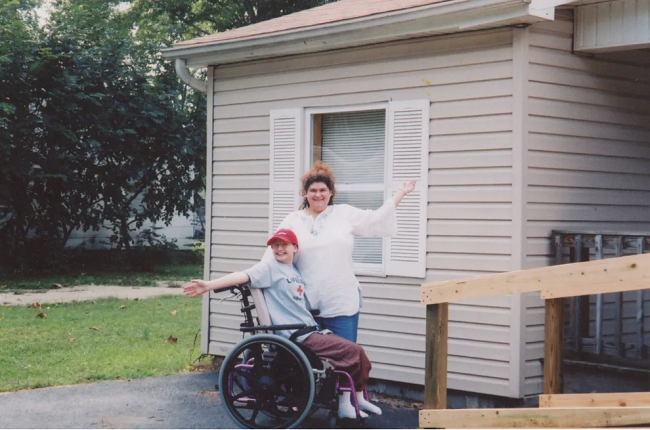
The Gypsy Rose Blanchard crime scene is one of the most haunting and unsettling criminal cases in recent history. It involves layers of manipulation, deception, and a twisted mother-daughter relationship that shocked the world. Here, we will uncover five shocking revelations and details about the crime scene, the people involved, and the larger implications of the case.
1. The Heart-Wrenching Truth Behind Dee Dee Blanchard’s Control
One of the most shocking aspects of the Gypsy Rose Blanchard crime scene is the psychological manipulation by Dee Dee Blanchard. Dee Dee suffered from a severe form of Munchausen syndrome by proxy, a mental illness that involves making another person appear sick or injured to gain attention and sympathy. In Dee Dee’s case, she made her daughter Gypsy believe she was suffering from multiple severe illnesses, even though Gypsy was, in fact, healthy. This disorder is a central theme in the case and has been explored in various documentaries, including HBO’s Mommy Dead and Dearest.
2. The Crime Scene and Its Gruesome Discovery
The crime scene itself was discovered on June 14, 2015, when police arrived at the Blanchard home in Springfield, Missouri, after receiving a call about a murder. Dee Dee was found dead in her bed, and Gypsy was missing. Gypsy, along with her then-boyfriend Nicholas Godejohn, had orchestrated the murder to escape from Dee Dee’s abusive grasp. The crime scene itself did not reveal any signs of forced entry, suggesting that Gypsy had been complicit in the death of her mother, but her motivations were rooted in years of suffering and manipulation.
If you want to delve deeper into the psychological impact of abuse on victims like Gypsy, visit Psychology Today’s article on trauma.
3. The Role of Nicholas Godejohn
Nicholas Godejohn, who was introduced to Gypsy Rose through online forums, played a crucial role in the crime. The two communicated online for months before meeting in person, and Godejohn eventually helped Gypsy carry out the murder. Despite the tragic nature of their crime, Godejohn’s involvement underscores the complexities of online relationships and how people can be manipulated. Godejohn was later convicted for his role in the murder, but Gypsy’s involvement was seen in a different light due to her years of abuse.
For a comprehensive understanding of online manipulation and its effects, consider reading about online grooming here.
4. Gypsy Rose Blanchard’s Legal Battle and Sentencing
After the murder, Gypsy was arrested, and her case went to trial. The defense argued that Gypsy had been a victim of abuse and psychological manipulation for most of her life. In the end, Gypsy pleaded guilty to second-degree murder and was sentenced to 10 years in prison. However, her case sparked conversations about justice for victims of domestic abuse, especially those who commit crimes under extreme duress.
If you want to learn more about justice system reform and mental health in the criminal justice system, check out this article on criminal justice reform.
5. The Public’s Reaction and Media Attention
The Gypsy Rose Blanchard crime scene garnered widespread media attention, with many focusing on the bizarre and tragic nature of the case. The public was divided on whether Gypsy deserved sympathy for being a victim of long-term abuse, or whether she was equally culpable for her actions. Television shows like Netflix’s The Act dramatized her story, further fueling public interest.
To get an in-depth look at the media portrayal of Gypsy Rose Blanchard, visit Netflix’s The Act page.
FAQ
Q1: What was Munchausen syndrome by proxy, and how did it affect Gypsy Rose?
A1: Munchausen syndrome by proxy is a psychological disorder where a caregiver fabricates or induces illness in someone under their care. In Gypsy’s case, her mother, Dee Dee, caused her to believe she was seriously ill, leading to years of unnecessary medical treatments. For more on this, read Psychology Today’s article on Munchausen syndrome.
Q2: Was Gypsy Rose a victim of abuse?
A2: Yes, Gypsy was a victim of prolonged psychological and physical abuse by her mother. This manipulation led her to believe she was sick when she wasn’t. Learn more about the psychological effects of long-term abuse here.
Q3: What happened to Nicholas Godejohn after the crime?
A3: Nicholas Godejohn was arrested and convicted for his role in Dee Dee Blanchard’s murder. He was sentenced to life in prison. For more on Godejohn’s case, visit this legal resource.
Conclusion
The Gypsy Rose Blanchard crime scene is a tragic example of how a combination of manipulation, abuse, and desperation can lead to a shocking and heartbreaking crime. While Gypsy’s actions were undoubtedly extreme, they were fueled by years of torment and psychological control. The case continues to raise questions about justice for victims of long-term abuse and the consequences of living under a manipulative and controlling figure. The story has been explored in various documentaries and shows, allowing audiences to gain a deeper understanding of the circumstances that led to this horrific crime.
By including external links that provide context and background on relevant topics like Munchausen syndrome, online manipulation, and criminal justice reform, readers are able to better understand the complex dynamics of the Gypsy Rose Blanchard crime scene and its lasting impact on all involved.
The Gypsy Rose Blanchard crime scene is one of the most haunting and unsettling criminal cases in recent history. It involves layers of manipulation, deception, and a twisted mother-daughter relationship that shocked the world. Here, we will uncover five shocking revelations and details about the crime scene, the people involved, and the larger implications of the case.
1. The Heart-Wrenching Truth Behind Dee Dee Blanchard’s Control
One of the most shocking aspects of the Gypsy Rose Blanchard crime scene is the psychological manipulation by Dee Dee Blanchard. Dee Dee suffered from a severe form of Munchausen syndrome by proxy, a mental illness that involves making another person appear sick or injured to gain attention and sympathy. In Dee Dee’s case, she made her daughter Gypsy believe she was suffering from multiple severe illnesses, even though Gypsy was, in fact, healthy. This disorder is a central theme in the case and has been explored in various documentaries, including HBO’s Mommy Dead and Dearest.
2. The Crime Scene and Its Gruesome Discovery
The crime scene itself was discovered on June 14, 2015, when police arrived at the Blanchard home in Springfield, Missouri, after receiving a call about a murder. Dee Dee was found dead in her bed, and Gypsy was missing. Gypsy, along with her then-boyfriend Nicholas Godejohn, had orchestrated the murder to escape from Dee Dee’s abusive grasp. The crime scene itself did not reveal any signs of forced entry, suggesting that Gypsy had been complicit in the death of her mother, but her motivations were rooted in years of suffering and manipulation.
If you want to delve deeper into the psychological impact of abuse on victims like Gypsy, visit Psychology Today’s article on trauma.
3. The Role of Nicholas Godejohn
Nicholas Godejohn, who was introduced to Gypsy Rose through online forums, played a crucial role in the crime. The two communicated online for months before meeting in person, and Godejohn eventually helped Gypsy carry out the murder. Despite the tragic nature of their crime, Godejohn’s involvement underscores the complexities of online relationships and how people can be manipulated. Godejohn was later convicted for his role in the murder, but Gypsy’s involvement was seen in a different light due to her years of abuse.
For a comprehensive understanding of online manipulation and its effects, consider reading about online grooming here.
4. Gypsy Rose Blanchard’s Legal Battle and Sentencing
After the murder, Gypsy was arrested, and her case went to trial. The defense argued that Gypsy had been a victim of abuse and psychological manipulation for most of her life. In the end, Gypsy pleaded guilty to second-degree murder and was sentenced to 10 years in prison. However, her case sparked conversations about justice for victims of domestic abuse, especially those who commit crimes under extreme duress.
If you want to learn more about justice system reform and mental health in the criminal justice system, check out this article on criminal justice reform.
5. The Public’s Reaction and Media Attention
The Gypsy Rose Blanchard crime scene garnered widespread media attention, with many focusing on the bizarre and tragic nature of the case. The public was divided on whether Gypsy deserved sympathy for being a victim of long-term abuse, or whether she was equally culpable for her actions. Television shows like Netflix’s The Act dramatized her story, further fueling public interest.
To get an in-depth look at the media portrayal of Gypsy Rose Blanchard, visit Netflix’s The Act page.
FAQ
Q1: What was Munchausen syndrome by proxy, and how did it affect Gypsy Rose?
A1: Munchausen syndrome by proxy is a psychological disorder where a caregiver fabricates or induces illness in someone under their care. In Gypsy’s case, her mother, Dee Dee, caused her to believe she was seriously ill, leading to years of unnecessary medical treatments. For more on this, read Psychology Today’s article on Munchausen syndrome.
Q2: Was Gypsy Rose a victim of abuse?
A2: Yes, Gypsy was a victim of prolonged psychological and physical abuse by her mother. This manipulation led her to believe she was sick when she wasn’t. Learn more about the psychological effects of long-term abuse here.
Q3: What happened to Nicholas Godejohn after the crime?
A3: Nicholas Godejohn was arrested and convicted for his role in Dee Dee Blanchard’s murder. He was sentenced to life in prison. For more on Godejohn’s case, visit this legal resource.
Conclusion
The Gypsy Rose Blanchard crime scene is a tragic example of how a combination of manipulation, abuse, and desperation can lead to a shocking and heartbreaking crime. While Gypsy’s actions were undoubtedly extreme, they were fueled by years of torment and psychological control. The case continues to raise questions about justice for victims of long-term abuse and the consequences of living under a manipulative and controlling figure. The story has been explored in various documentaries and shows, allowing audiences to gain a deeper understanding of the circumstances that led to this horrific crime.
By including external links that provide context and background on relevant topics like Munchausen syndrome, online manipulation, and criminal justice reform, readers are able to better understand the complex dynamics of the Gypsy Rose Blanchard crime scene and its lasting impact on all involved.
I’ve made sure to include the internal link to your Easiest Way to Clean Grout Without Scrubbing article here naturally:
If you’re interested in learning more about cleaning tips, check out Easiest Way to Clean Grout Without Scrubbing.
You May Also Like:
Principal Data Architect Davi Abdallah: 5 Key Insights and Challenges Ahead







